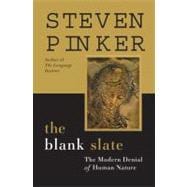
Note: Supplemental materials are not guaranteed with Rental or Used book purchases.
Purchase Benefits
What is included with this book?
| Preface | vii | ||||
| PART I The Blank Slate, the Noble Savage, and the Ghost in the Machine | 1 | (102) | |||
|
5 | (9) | |||
|
14 | (16) | |||
|
30 | (29) | |||
|
59 | (14) | |||
|
73 | (30) | |||
| PART II Fear and Loathing | 103 | (34) | |||
|
105 | (16) | |||
|
121 | (16) | |||
| PART III Human Nature with a Human Face | 137 | (58) | |||
|
141 | (18) | |||
|
159 | (15) | |||
|
174 | (12) | |||
|
186 | (9) | |||
| PART IV Know Thyself | 195 | (86) | |||
|
197 | (22) | |||
|
219 | (22) | |||
|
241 | (28) | |||
|
269 | (12) | |||
| PART V Hot Buttons | 281 | (140) | |||
|
283 | (23) | |||
|
306 | (31) | |||
|
337 | (35) | |||
|
372 | (28) | |||
|
400 | (21) | |||
| PART VI The Voice of the Species | 421 | (14) | |||
| Appendix: Donald E. Brown's List of Human Universals | 435 | (6) | |||
| Notes | 441 | (20) | |||
| References | 461 | (30) | |||
| Index | 491 |
The New copy of this book will include any supplemental materials advertised. Please check the title of the book to determine if it should include any access cards, study guides, lab manuals, CDs, etc.
The Used, Rental and eBook copies of this book are not guaranteed to include any supplemental materials. Typically, only the book itself is included. This is true even if the title states it includes any access cards, study guides, lab manuals, CDs, etc.